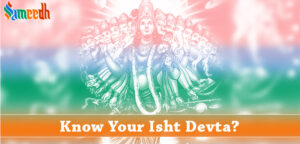In Hinduism, an Ishta Devta, also known as Ishta Dev or Ishtadev, refers to a personal deity or chosen deity whom an individual worships and devotes themselves to.

The term “Isht Devta” translates to “cherished deity” or “beloved deity.” This chosen deity holds a special significance for the individual, often representing their personal beliefs, aspirations, and spiritual goals.
The Isht Devta is chosen based on personal inclination, spiritual affinity, or familial tradition. It is a deeply personal choice made by an individual based on their spiritual journey, experiences, and beliefs.
The Isht Devta can be any form of God or Goddess worshipped in Hinduism. Common Isht Devtas include forms of Vishnu (such as Krushna, Ram, or Narayan), Shiv (such as Mahadev or Shambhu), Devi (such as Durga, Kali, or Lakshmi), or any other deity from the Hindu pantheon.
Devotees of an Ishta Devata cultivate a personal relationship with their chosen deity through rituals, prayers, meditation, and devotional practices. They seek guidance, blessings, and divine grace from their Ishta Devata in all aspects of life, including spiritual, emotional, and material realms.
In Hinduism, the concept of Ishta Devata is closely linked to the path of Bhakti Yoga, the yoga of devotion. Devotees believe that through unwavering devotion and surrender to their Ishta Devata, they can attain spiritual liberation (moksh) and union with the divine.
Different Hindu sects and lineages may have their own unique practices and preferences regarding Ishta Devata worship. Some devotees may worship a single deity exclusively, while others may have multiple Ishta Devatas representing different aspects of divinity.
Worship of the Ishta Devata typically involves performing daily rituals, offering prayers, reciting mantras, and making offerings such as flowers, incense, and food. Devotees may also visit temples dedicated to their Ishta Devata to seek blessings and participate in religious ceremonies.
Discovering your Ishta Devata, or chosen deity, is a deeply personal and spiritual journey. Here are some steps you can take to help uncover your Ishta Devata:
- Self-Reflection and Introspection: Take time to reflect on your spiritual inclinations, beliefs, and experiences. Consider what qualities or attributes you seek in a deity and what aspects of divinity resonate with you the most.
- Study and Research: Explore the vast pantheon of Hindu deities through scriptures, mythology, and literature. Learn about the stories, qualities, and symbolism associated with different gods and goddesses. Pay attention to the deities that evoke a sense of curiosity, inspiration, or resonance within you.
- Prayer and Meditation: Engage in prayer, meditation, and contemplative practices to quiet the mind and connect with your inner self. Seek guidance from within and ask for clarity in discovering your Ishta Devata. Pay attention to any intuitive insights, feelings, or experiences that arise during your spiritual practices.
- Consultation with a Guru or Spiritual Guide: Seek guidance from a knowledgeable guru, spiritual teacher, or astrologer who can provide insights and assistance in discovering your Ishta Devata. They may offer spiritual guidance, divination techniques, or astrological insights to help you identify the deity most aligned with your spiritual path.
- Pay Attention to Synchronicities: Notice any synchronicities, signs, or coincidences that occur in your life, as they may offer guidance or confirmation in your search for your Ishta Devata. Trust your intuition and be open to receiving guidance from unexpected sources or experiences.
- Follow Your Heart: Ultimately, trust your heart and inner guidance in discovering your Ishta Devata. Allow yourself to be drawn to the deity or deities that resonate with your soul and bring you a sense of peace, joy, and spiritual connection.
Remember that discovering your Ishta Devata is a journey of self-discovery and spiritual exploration. Be patient, open-minded, and receptive to the divine guidance that unfolds along the way. Once you have identified your Ishta Devata, cultivate a deep and meaningful relationship through devotion, worship, and spiritual practices.
Overall, the concept of Ishta Devata reflects the deeply personal and intimate relationship between the individual devotee and the divine. It serves as a guiding light on the spiritual journey, providing solace, inspiration, and divine grace to seekers striving for spiritual growth and enlightenment.